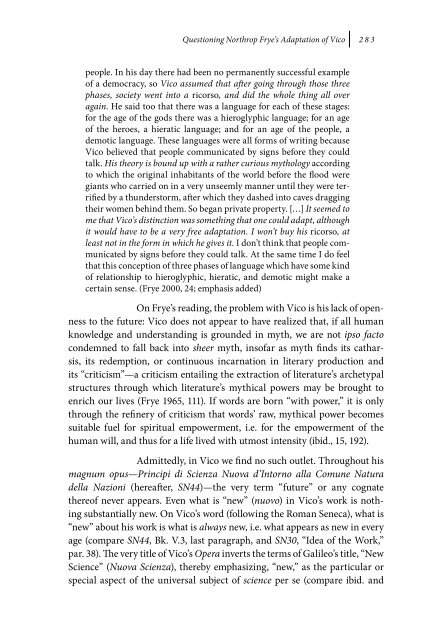Spring 2010 - Interpretation
Spring 2010 - Interpretation
Spring 2010 - Interpretation
You also want an ePaper? Increase the reach of your titles
YUMPU automatically turns print PDFs into web optimized ePapers that Google loves.
Questioning Northrop Frye’s Adaptation of Vico<br />
2 8 3<br />
people. In his day there had been no permanently successful example<br />
of a democracy, so Vico assumed that after going through those three<br />
phases, society went into a ricorso, and did the whole thing all over<br />
again. He said too that there was a language for each of these stages:<br />
for the age of the gods there was a hieroglyphic language; for an age<br />
of the heroes, a hieratic language; and for an age of the people, a<br />
demotic language. These languages were all forms of writing because<br />
Vico believed that people communicated by signs before they could<br />
talk. His theory is bound up with a rather curious mythology according<br />
to which the original inhabitants of the world before the flood were<br />
giants who carried on in a very unseemly manner until they were terrified<br />
by a thunderstorm, after which they dashed into caves dragging<br />
their women behind them. So began private property. […] It seemed to<br />
me that Vico’s distinction was something that one could adapt, although<br />
it would have to be a very free adaptation. I won’t buy his ricorso, at<br />
least not in the form in which he gives it. I don’t think that people communicated<br />
by signs before they could talk. At the same time I do feel<br />
that this conception of three phases of language which have some kind<br />
of relationship to hieroglyphic, hieratic, and demotic might make a<br />
certain sense. (Frye 2000, 24; emphasis added)<br />
On Frye’s reading, the problem with Vico is his lack of openness<br />
to the future: Vico does not appear to have realized that, if all human<br />
knowledge and understanding is grounded in myth, we are not ipso facto<br />
condemned to fall back into sheer myth, insofar as myth finds its catharsis,<br />
its redemption, or continuous incarnation in literary production and<br />
its “criticism”—a criticism entailing the extraction of literature’s archetypal<br />
structures through which literature’s mythical powers may be brought to<br />
enrich our lives (Frye 1965, 111). If words are born “with power,” it is only<br />
through the refinery of criticism that words’ raw, mythical power becomes<br />
suitable fuel for spiritual empowerment, i.e. for the empowerment of the<br />
human will, and thus for a life lived with utmost intensity (ibid., 15, 192).<br />
Admittedly, in Vico we find no such outlet. Throughout his<br />
magnum opus—Principi di Scienza Nuova d’Intorno alla Comune Natura<br />
della Nazioni (hereafter, SN44)—the very term “future” or any cognate<br />
thereof never appears. Even what is “new” (nuovo) in Vico’s work is nothing<br />
substantially new. On Vico’s word (following the Roman Seneca), what is<br />
“new” about his work is what is always new, i.e. what appears as new in every<br />
age (compare SN44, Bk. V.3, last paragraph, and SN30, “Idea of the Work,”<br />
par. 38). The very title of Vico’s Opera inverts the terms of Galileo’s title, “New<br />
Science” (Nuova Scienza), thereby emphasizing, “new,” as the particular or<br />
special aspect of the universal subject of science per se (compare ibid. and
















